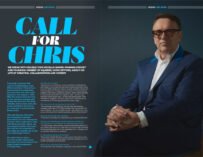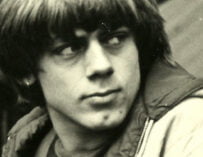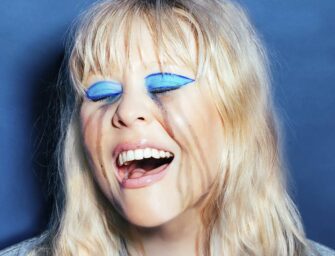
Chris Difford & Glenn Tilbrook (not necessarily in that order)
Who have Sodajerker been talking to this month? Only one of the greatest British songwriting teams in history, that’s all…
![]() f we said ‘great British songwriting duos’, who would you think of? John Lennon and Paul McCartney, for sure. Probably Elton John and Bernie Taupin or Mick Jagger and Keith Richards, too. But we’re willing to bet that Difford and Tilbrook would be in the top five, at the very least. The songwriting partners at the heart of Squeeze have, over the course of four decades, acquired a standing in the hearts of those who love a well-crafted melody and a clever lyric that far exceeds their commercial success – though they haven’t exactly lacked for the latter, either.
f we said ‘great British songwriting duos’, who would you think of? John Lennon and Paul McCartney, for sure. Probably Elton John and Bernie Taupin or Mick Jagger and Keith Richards, too. But we’re willing to bet that Difford and Tilbrook would be in the top five, at the very least. The songwriting partners at the heart of Squeeze have, over the course of four decades, acquired a standing in the hearts of those who love a well-crafted melody and a clever lyric that far exceeds their commercial success – though they haven’t exactly lacked for the latter, either.
As the quintessentially British band Squeeze are, however, quite a British phenomenon in sales terms too, it’s probably worth a quick recap here for the benefit of our non-UK readers. The band formed in Deptford, south London in 1974, when Chris Difford and Glenn Tilbrook were just 20 and 17, respectively. Originally featuring Jools Holland on keyboards, their heyday was during the new wave era, when they racked up seven Top 40 singles and a string of hit albums, including a No 2 with perhaps their best-known song, Cool For Cats. The band split in 1982 but reunited from 1985-1999, scoring another big hit with 1987’s Hourglass, then reunited again in 2007.
Both Chris Difford and Glenn Tilbrook have also had successful solo careers, as well as recording and touring simply as Difford & Tilbrook. Chris Difford’s last solo album was 2011’s Cashmere If You Can, while Glenn Tilbrook has just released a new solo long-player entitled Happy Ending. Which is where our friends at Sodajerker take up the story…

Glenn Tilbrook
GLENN TILBROOK
There seems to be a theme on your new album of using people’s names as song titles: you’ve got Ray, Rupert, Kev & Dave, Dennis… what was the thinking behind that?
“It was actually going to be a whole album with names of people, but as I went on I wanted some of the album to be political as well, so you have songs like Everybody Sometimes. I’ve come to political writing late in life, but it’s really important to me to express how I feel about things.
“There were two things that sparked that song off. One was that my son was involved in the demonstrations against student cuts in London a couple of years ago and was kettled by the police, kept in the same spot without food, water or toilets for eight hours. And also one of his best friends, who’s never been involved in violence, was charged with disorderly conduct by the police, and for 18 months had the threat of jail hanging over his head. I was thinking about the amount of time and effort and money that took, versus the time and effort and money not spent by the Government chasing the people who brought Britain to its knees in the financial crisis. That’s wrong to me, and it’s important to put a line in the sand.”
“Yes, I can… it was a really complex, detailed, Phil Spector-ish arrangement with loads of chord changes, and I just dreamt it. And I woke up and couldn’t play it! And then I made the verse bit up, which was more like something you’d expect from an 11-year-old. It took me a long to realise that what I had was a gift, because I’ve always loved music and I’ve never really had to work at loving it or playing it.”
You started on piano, didn’t you?
“Yes, but only till I was about 14. But that’s been enough to see me through songwriting, and that’s where I learned how great different bass notes can be with chords. Without that, I couldn’t have written a song like Tempted, which really relies on the bass changing when the chords don’t.”
“The Monkees were the first band to really get their hooks in me”
Who were you listening to in those formative years?
“The Monkees were the first band to really get their hooks in me. And that led me to The Beatles – I bought The White Album when I was 11, and I count myself really lucky to have had that as my introduction to The Beatles.”
Your guitar-playing is a big part of your sound as well… were there any specific influences from a guitar perspective?
“Until I was 13, I was only interested in chords… and then I heard Jimi Hendrix and that was a big thing for me. Pretty soon I realised what a great songwriter he was, too… people latch onto his playing but his songwriting was great as well.”
You’re known as a very prolific songwriter… is the process any more knowable to you now?
“That’s a good question, because whatever you think you know about songwriting, you still don’t know when you come to write the next song. I always try and start with lyrics, but I still get stuck: I get stuck on lyrics, I get stuck on tunes, I think things aren’t good enough or I think things are better than they are! There’ll be one song on every record that’s a gift, that just comes to you… the rest will be work followed by a bit of inspiration followed by a bit more work. But it’s a good thing to have that sort of discipline… and I also do think that songwriting is like a muscle. You get flabby if you don’t use it; once you get it going it becomes easier and easier.”
The relationship that gave rise to many of your songs is your partnership with Chris. Did you naturally fall into the roles of Chris writing words and you writing music?
“Yeah, because when we met his words were so much better than mine, and my tunes were probably better than his! So he gave me a lyric, I put a tune to it, we both liked it and really, we’ve never looked back from then. The words always come first and then the tune’s written to fit them.”
It’s incredible to us that a song like Cool For Cats can work so well without the words being made to fit the music…
“Well actually, that was the exception to the rule! Because with that song, we had the backing track and it was completely different, it was much slower. And then Chris came back the next day and he’d done that and it was just like, ‘Wow’.”
“Whenever I write, I try and be around a keyboard AND a guitar”
Once you’ve got the words, do you generally reach for the guitar, or do the words sometimes suggest another instrument?
“Whenever I write, I try and be around a keyboard and a guitar. If you can’t have both, either works, but I like to flit between the two. Tempted was written on the piano, and so were Pulling Mussels (From The Shell), Another Nail In My Heart and Black Coffee In Bed.”
You wrote Hourglass together in the same room, is that right?
“Well, Chris came up with the lyric for the verses and then I added the chorus, really just as an idea to give to Chris for how it could be but we ended up keeping my words. It just felt right.”
It’s a great chorus… and then in contrast, Up The Junction doesn’t really have a chorus at all…
“When Chris gave me the lyric to that song, it was seven quite dense verses but it told a really good story, so I saw my job as being to be unobtrusive. It made me think of Bob Dylan – that’s who I was being in my head, even though it doesn’t sound like Bob Dylan. The original backing track was just chords, though, so it was a bit The Band-ish. We did try adding a chorus but we ended up not using it: the whole story was already there so the chorus was surplus to requirements.”

Glenn Tilbrook
How important is arrangement to you? Do you think a good song can stand up in any format, or does the arrangement need to be definitive as well?
“I’m a firm believer in the idea that you can arrange a song in 20 different ways, and that the way you write a song isn’t necessarily the way that it should be. Tempted, for instance, was written as a grand, ELO-type orchestral pop song… that’s how I thought it should be, and we recorded it like that, and it sounded horrible! So we did it again and came up with the version that everyone knows.”
In recent years you’ve written with people like Ron Sexsmith and Aimee Mann… is that different from writing with Chris?
“Well, when I was writing with Ron and Aimee, it was when I was feeling particularly vulnerable lyrically… I needed someone who could write lyrics and they did that job brilliantly for me. With my new album, Happy Ending, I’ve written all the lyrics, but I still like giving tunes to people and getting different stuff back from them.”
“I bought a MiniMoog with my first-ever royalty cheque”
On some of the early Squeeze tracks you made a lot of use of synthesizers, drum machines and so on… was that technology used at the writing stage or was that more of a production choice?
“No, I’m mad about all that stuff! I bought a MiniMoog with my first-ever royalty cheque… and when we formed Squeeze, you could still find old Mellotrons knocking around. They were just brilliant! Today, I love working on the iPad, because there are some really great apps there. I don’t like to rule anything out, because whenever I get into one way of working, next time I like to change things around. You’ve got to always try and surprise yourself, and not believe you’ve got it cracked.”
Finally, we hear there’s a new Squeeze album in the pipeline?
“Yes, there is. It’s based on Danny Baker’s book and TV series, so ITV are paying for us to make two Squeeze albums – one per year for the next two years. We get two songs per episode but we’re still free agents – the songs aren’t about the characters on-screen, they’re more kind of contemplative, running parallel. It’s an interesting way to work because it gives us a purpose… and a budget! So we can afford to go orchestral, if we want. And I do want… I want to go massive again!”

Chris Difford
CHRIS DIFFORD
From your solo album Cashmere If You Can, the song Like I Did really stands out to us… although it’s about your kids you seem to reveal a lot about yourself in it, too.
“Yeah, I think all three of my solo albums are very revealing. In fact with the second one, my kids listened to it and told me off for being so honest about our relationship! But songwriting is about honesty, it’s about revealing part of your soul that you don’t normally let go of. With Squeeze it’s always been very different, it’s about me using my imagination and the characters that live there to create songs. With solo records, you can go deeper.”
A lot of songwriters claim they write their best songs when they’re unhappy. Would you say that applies to you?
“I think songwriting is a therapy… the writing desk is like the psychiatrist’s chair, and when I’m writing for myself I can go deeper and write about my feelings, what upsets me, what drives me. I have done that a little bit in Squeeze but not as much… and I notice that on Glenn’s new solo album there’s a lot of deep stuff going on lyrically there, too. So I do think it’s like a form of therapy, yes.”
You’ve worked with a lot of well-respected artists as well as Glenn – people like Elton John, Bryan Ferry and Elvis Costello. Is there anyone who’s really surprised you as a songwriter, or taught you something about the process?
“Yeah, working with Elton was such an experience! We put the lyric on the piano and the song was written in about five or six minutes. Then we got in a car and went to a studio close to his house, where there was a band waiting, and he played it to them once, they recorded it and I was back in my house by teatime!
“And writing with Francis Dunnery was I think one of the most important times of my life, because he really pushed me to do things I’d never done. Writing with Glenn, on the other hand, is a completely different kind of chemistry… one that goes back 42 years and has a kind of unsaid personality all of its own.”
Marti Pellow’s another person you’ve written for… what did you learn from that collaboration?
“I learned how to juggle, because I was managing him at the same time so I’d be writing lyrics, ordering Chinese meals and booking tours, all in the same breath. It was hard work, because he was pretty relentless. When he came to live with me after coming out of rehab, we had writers down every day of the week, and if he hadn’t got a song down by lunchtime he’d be disappointed. By the end of the day, every writer we had down we’d written three songs with. It was like his addiction had moved from one part of his personality to another.”
Squeeze songs have a lot of colourful language, and references to particular people and places. When you’re writing for other people, do have to work to make it more universal?
“Yeah, writing specifically for other people is always a challenge, but it’s something I enjoy doing. Last year I did some writing for Sarah Brightman, and the brief was ‘spirituality and space travel’, so that was an interesting one! She’s going up in a spaceship in a couple of years’ time, so I wrote about that voyage. I was excited for her, and I’ve always been interested in aeroplanes and stuff so I wrote it from the point of view of a nine- or ten-year-old boy going off into space, and then transplanted her personality on top of it.”
At what age did you actually start writing songs?
“I started out in a band with three friends, when I was 16 or so. Before that, at school, I was bored of doing academic stuff, so I just used to write poetry, and then one day a really good English teacher asked me had I heard of Bob Dylan? And I hadn’t, so he brought a record player in and played me some Bob Dylan, and that’s when it struck me that poetry could also be songs… that the two could marry up.
“So I carried on writing with that inspiration he’d given me. I’ve got reams of it here, and most of it is rubbish, really, but those were the building blocks that got me where I needed to be.”

Chris Difford
What artists particularly influenced you in those early days?
“Well, I always wanted to be in a band because I liked The Who and The Small Faces… I liked the energy of being in a gang. Being in a band was everything to me, so when I met Glenn it was natural to form a band, go out on tour and cause havoc for a couple of years!”
Can you remember the first songs you wrote?
“I remember the first song I wrote with Glenn… we were in the back of a van going to the Windsor Free Festival, and Glenn asked me for a lyric so I gave him the lyric to a song called Hotel Woman, along with about six or seven others. And he wrote a couple of tunes, and it immediately became apparent to me that my days of writing music were over, that this was something I was going to do with Glenn.”
Was it good to pass him a lyric and get back a tape with songs on it?
“It always is. Since Christmas I’ve been working on a new bunch of lyrics, and I gave them to him last week. It’s a kind of ritual we go through: he asks me for lyrics and I say I haven’t got any, then I scurry around for ideas and about a month later I’ll give him a folder with about 30 lyrics in it. And then I wait six or seven weeks, and then he’ll say, ‘I’ve read your lyrics, and I’m working on them’. And just yesterday I heard from Glenn’s manager saying that he was opening the lyrics book, so we’re on part two of that journey.”
Do you still write because you feel compelled to express yourself, or is it more to keep the muscle going because that’s your job?
“I don’t feel compelled to write every day… I should write more, really, but lately I’ve been writing a book, which has been keeping me busy, and I’m also working with The Stripes, so it’s finding the time and the space. It’s often difficult to say I’m not going to do anything other than write lyrics.”
Do lyrics tend to come quickly for you?
“I’ll usually get them done pretty quickly and then come back to them a couple of days later. And if it still looks like it’s going to come up with something, then I’ll carry on.”
“It was really Benny Hill that inspired Cool For Cats”
Let’s talk about a few Squeeze songs specifically. What do you remember about the writing of Cool For Cats?
“We had the backing track for that on a cassette, and I was living in Greenwich in London, trying to find a way of writing a lyric for it, and I was getting a bit stuck. So I had a cup of tea and some cheese on toast, and Benny Hill was on telly… and it was really Benny Hill that inspired Cool For Cats, because the metre of his songs is a lot like that. So I came up with all these vignettes of TV shows, like Wagon Train and The Sweeney, and I put them all together. And the next day we went in the studio and I read the lyrics to Glenn, and that was it.”
What about Tempted… Glenn’s told us that was a lot of work musically. Did the lyrics come more quickly?
“Yes, I know Glenn laboured over that one, but then it’s got lots of chords in it so that’s probably why. Lyrically, it came very quickly – I literally wrote it on a fag packet in a taxi on the way to the airport. I just ripped open a packet of Senior Service and started writing down what I saw, and by the time I got to the airport the song was done. And then I gave it to Glenn when we got back from the tour we were on, and we recorded it first with Dave Edmunds, and he made it sound like ELO. It’s a very different version: it’s great, but not as great as the version that Elvis Costello came up with.”

Squeeze in younger days
Another quintessential Squeeze song is Up The Junction…
“I love that song – I do it in my set now but I do it like a Velvet Underground song, very laidback and dry and dark. Glenn’s great at bringing jolly to dark, but when I do our songs in my set I keep them dark.
“It’s a lyric that was very easy to write: it was inspired by Play For Today which used to be on telly when I was a kid, where you had these 30-minute plays written by people like Harold Pinter. Our manager, Miles Copeland, said it would never be a hit because it didn’t have a chorus. But luckily, our record company disagreed with him!”
We read that, in a break from your usual process, Hourglass was written together in the same room…
“Yes, we did… and as an experience I didn’t really enjoy it that much. It was a bit weird… if I can be so crude, it was like two guys trying to masturbate in the same room, it was very embarrassing. It would have worked better if there was a red curtain in the middle! Glenn’s talked about doing that again now, but I don’t know… I find the process of writing very personal, you need space to be emotional and when you’re in a room with someone they bring all their baggage in with them. I’d rather be in my own little space, really.”

The classic Squeeze line-up
Some of the early Squeeze records make a lot of use of electronic elements, as do some of your recent songs like Passion Killer. Are you interested that part of the record-making process, or do you prefer to just concentrate on the words?
“No, Glenn is the studio beaver, he loves being in there among the dials and the different guitars and foot pedals. You should see his studio: there’s cables everywhere, and keyboards from 1965 and all that sort of thing. But I can’t tell you how boring that is for me. I like recording live with a band, because there’s something really exciting about that, but when it comes to the minutiae of the guitar over-dubs, I find that really tedious. Even though I do know how important it is.
“Glenn and I haven’t made an album together for 15, 16 years and we’re going to start work on one this year, so I’m going to have to be a bit more tolerant to make that work!”
Finally, you also run songwriting retreats… can you tell us about those?
“There are two this year. The first one is in a beautiful house in Glastonbury, around the time of the festival. There’ll be about 15 or 20 people there, I hope, and it’s really just a hothouse for people with ideas who are brave enough to try working with people they’ve never met before! And the second workshop is in October, and that’s in association with The Arvon Foundation, which is a great organisation set up by Ted Hughes some years ago. They have about three houses around the country and they have tuition constantly taking place, not just for songwriting but for poetry, scriptwriting and all sorts of things.
“I’ve been doing it for about 25, 30 years now, and all the people that have come to the writing workshops have stayed in contact with each other, so it’s been a lovely thing to create a community of writers who can share their experiences with each other.”
Do you give tips on how you write songs, or is it mainly about facilitating their own process?
“It’s a bit of both. Some of the younger writers will ask me questions, and we’ll sit and debate songwriting, but mostly it’s about just putting them in a room. You can’t teach songwriting, I don’t think. I tried it: I was a tutor at a university for a couple of years – Tom Odell was one of my students, as a matter of fact – and the people who ran the university gave me a great big book to follow. At the end of the first period, I took all the students outside and set fire to it.”
About Sodajerker

With over 50 episodes under their belt, internationally renowned songwriters are queuing up to be interviewed by Liverpool-based duo Sodajerker. Established in 2012 by songwriters Simon Barber and Brian O’Connor, the Sodajerker On Songwriting podcast has welcomed guests including Billy Bragg, Neil Sedaka, Johnny Marr, Linda Thompson, Neil Finn, Rufus Wainwright and Suzanne Vega, among many others.
To find out more about Sodajerker and their work, or to download their podcasts – including the full interviews with Messrs Difford & Tilbrook – go to www.sodajerker.com. You can also connect with them via www.facebook.com/sodajerker or www.twitter.com/sodajerker, or download the podcasts from iTunes.































Related Articles